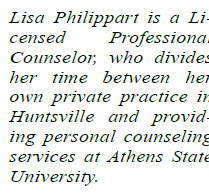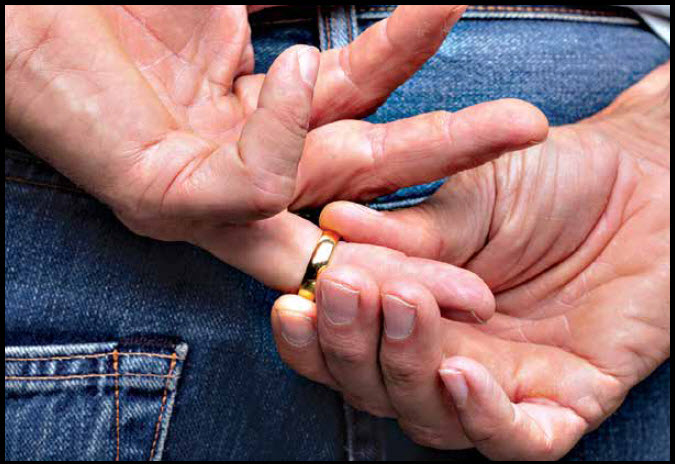 By: Lisa Philippart
By: Lisa Philippart
In my last article, I identified and addressed some of the signs of infidelity. In this article, I am following up with some strategies for coping after you have discovered that your partner has been unfaithful. Discovering that your partner has cheated on you can hit you like a ton of bricks. Your marriage/commitment has been thrown into a state of crisis that may destroy it. In my experiences, the betrayed partner wants to know why the cheating occurred. But there is rarely a simple answer as to why someone becomes unfaithful. It could be a symptom of other problems in the marriage. It could relate to something or someone from your partner’s past. Or it could be totally unrelated to you or to your marriage. No matter the reason or the cause, you will experience many complicated feelings to sort through, and a lot to think about as you decide to move forward. Let us look at some ways to help you cope with the aftermath of betrayal.
I believe it is important to begin by accepting your feelings. Shock, anger, resentment, fear, sadness, confusion, and agitation are all normal reactions. You may feel like you are on an emotional roller coaster for a while. I often tell clients that the feelings are similar to going through the grief process. You are experiencing the loss of the relationship you thought you had. It takes a long time to process the pain of having an unfaithful mate. Don’t expect the mixture of feelings and the mistrust to go away even if you are trying to forgive your partner and repair the damage done to your marriage. Your marriage is forever changed, and it is natural to grieve the relationship you once had. During this time, it is important to avoid the blame game. Blaming yourself, your partner, or the third party won’t change anything, and it’s just wasted energy. Try not to play the victim either, if you can help it. Wallowing in self-pity will only make you feel more helpless and bad about yourself.
 Being betrayed by your partner can induce extreme anger. In your furious state, your first instinct may be to punish your mate by trash talking to friends (or worse, on social media), or think about having an affair yourself to get even. You may get a temporary sense of satisfaction from these sorts of actions, but ultimately, they can work against you…keeping you in a state of anger instead of focusing on healing and moving on, alone or together. Think before you tell your family too. They will most likely have strong opinions about what you should do, but nobody really understands what goes on in another person’s marriage. Additionally, this situation should not involve your children. Even if you have decided to end your marriage, sharing details about an affair will only put your kids in an indefensible position, causing them anxiety, making them feel stuck in the middle, and forcing them to take sides.
Being betrayed by your partner can induce extreme anger. In your furious state, your first instinct may be to punish your mate by trash talking to friends (or worse, on social media), or think about having an affair yourself to get even. You may get a temporary sense of satisfaction from these sorts of actions, but ultimately, they can work against you…keeping you in a state of anger instead of focusing on healing and moving on, alone or together. Think before you tell your family too. They will most likely have strong opinions about what you should do, but nobody really understands what goes on in another person’s marriage. Additionally, this situation should not involve your children. Even if you have decided to end your marriage, sharing details about an affair will only put your kids in an indefensible position, causing them anxiety, making them feel stuck in the middle, and forcing them to take sides.
 You may have some physical reactions due to stress such as nausea, diarrhea, sleep problems (too much or too little), shakiness, difficulty concentrating, and under or overeating. Once the initial shock has passed, try to eat healthy foods, stay on a schedule/routine, sleep regular hours, get some exercise, and even have some fun. If you suspect that the affair will most likely lead to the end of your marriage, give some thought to practical matters, such as where you will live, financial issues, and if you have kids, the type of custody arrangements you want. You may also want to consider asking your partner to be tested for STDs, and to get yourself tested as well. Ultimately, don’t try to get through coping with unfaithfulness alone. Before you make any decisions about whether or not to end your marriage, it can be helpful to talk to a couple’s counselor. My job as a marital therapist is to remain neutral and help you gain insights into exactly what happened. The safe space of a counseling office allows you to ask your partner questions and share your feelings without losing your cool. I try to help couples to communicate better and process their feelings of guilt, shame, hurt, etc. So, if you decide to end the marriage, you will know that you tried your best to make it work.
You may have some physical reactions due to stress such as nausea, diarrhea, sleep problems (too much or too little), shakiness, difficulty concentrating, and under or overeating. Once the initial shock has passed, try to eat healthy foods, stay on a schedule/routine, sleep regular hours, get some exercise, and even have some fun. If you suspect that the affair will most likely lead to the end of your marriage, give some thought to practical matters, such as where you will live, financial issues, and if you have kids, the type of custody arrangements you want. You may also want to consider asking your partner to be tested for STDs, and to get yourself tested as well. Ultimately, don’t try to get through coping with unfaithfulness alone. Before you make any decisions about whether or not to end your marriage, it can be helpful to talk to a couple’s counselor. My job as a marital therapist is to remain neutral and help you gain insights into exactly what happened. The safe space of a counseling office allows you to ask your partner questions and share your feelings without losing your cool. I try to help couples to communicate better and process their feelings of guilt, shame, hurt, etc. So, if you decide to end the marriage, you will know that you tried your best to make it work.
By: Lisa Philippart
Licensed Professional Counselor









 June 20, 2025
June 20, 2025



